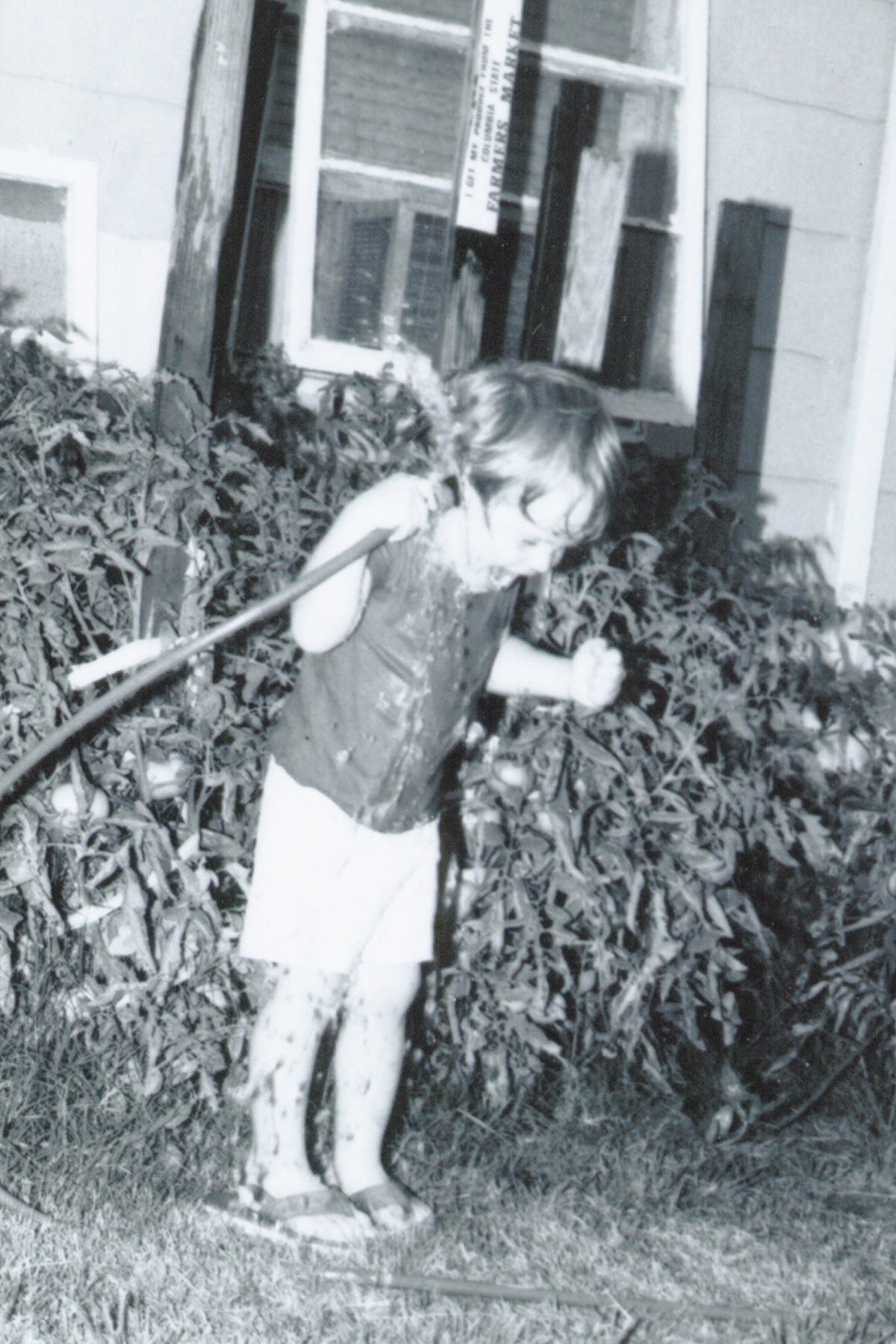I can’t remember a time when I wasn’t fascinated by science.
I don’t have any very early memories, but some of the photographic evidence strongly supports the notion that a desire to understand how the world works has always been a part of who I am.
Here I am at the age of zero (almost one), fascinated by the way water comes out of a hose:
My fascination did not wane as I grew older. I wasn’t just getting a sip of water here. I was observing how the water stayed together in clumps, and how you could constrain a hose to make it come out faster. I was deriving Ohm’s Law, even if I didn’t have that name for it just yet:
Even when I was drinking, I was trying to understand how the pressure inside me built up. Why would my ears or nose feel pressure when my mouth filled up with delicious hose water?
Not all of my early scientific experiments were equal in merit, but I was enthusiastic about them all:
This interest only intensified as science fiction started to provide a fertile outlet for my imagination, and I was able to connect these little experiments and observations about the real world with the worlds people envisioned. The scientific method requires you to bring the world of theory into the real world, so you can see if the theory holds up, and this was an early way to test bigger experiments.
Suffice it to say: there was never a time when I wasn’t into science, and my favorite field of study has probably always been physics. If you boil everything down to its core, the laws of physics describe everything that happens, including things that can be explained by other scientific fields like biology or chemistry.
I was pretty good at most of my science classes during my school years. I would say that my ability to grasp complex math concepts arose before my ability to grasp deeper scientific concepts, but science still came pretty naturally for me.
That’s why it was perhaps shocking when I decided I was going to fail physics for one particular nine weeks of my senior year. Now, I say decided like it was some kind of big plan, so I don’t want to give you the wrong impression. It really was something I felt I needed to do, though.
1992 was a year for breaking taboos. Nirvana’s Nevermind had rocked my world the previous year, but I was now about to become a senior in high school, and all the little seeds of rebellion that had been planted all throughout my life were showing green shoots for the first time. I had developed the courage not to conform, at least not all the time.
Mr. Spangler’s physics class happened to draw the shortest straw for me: the class was immediately after lunch, and my friends and I had gotten bolder and bolder as we grew closer to graduation. The tentative hold the school’s norms and rules had on us was loosening to the point where we almost felt like it didn’t matter at all.
In order to protest what we regarded as silly policies, we would sometimes cut off our own noses in order to spite our faces. One of these ways manifested in these extended lunches, and it was a direct response to a new policy where if you were more than five minutes late in returning to class after lunch, you would be marked as absent for that class.
I didn’t know the phrase perverse incentives yet, but I knew this policy was dumb. If the goal was to get kids to attend class, why not give them credit for the class, but punish them in some other way? As soon as I heard about this, I wanted to test the boundary right away by way of protest. Not to mention: my friends and I were having way more fun at lunch than I would have in fifth period anything.
At the same time, this was my senior year, and I had already been accepted to the University of South Carolina, where I would be an engineering major starting in 1993. I had never even gotten a D in school, much less actually failed a class, even for one of those nine-week periods. It was kind of now or never.
I often talk about how much of an idiot I was during my teenage years, but the truth is that I had enough wisdom not to put my academic future at risk. I knew my letter grade in this class wouldn’t matter, in other words.
Even today, I don’t regret deliberately flunking a class (for one period of the year, anyway—I got a C for the year). If there’s a regret to be had, it’s not taking advantage of Mr. Spangler’s mind, for he was enthusiastic about physics in a way that can actually capture a teenager’s attention. It’s too bad my own attention was elsewhere during this time.
My obsession over physics persists today, and I think it’s such a weird paradox that physics is the one class I decided I could afford to fail. Maybe I’m haunted by the ghost of Mr. Spangler whenever a jiu jitsu student completely phones in a class I’m teaching—jiu jitsu is super fun, but not everyone wants to pay close attention to the technique portion of class.









"Even when I was drinking, I was trying to understand how the pressure inside me built up."
I usually drink to forget the pressures of life, but you do you, man. You do you.
I owe failing physics—nearly, and in college, and not for lack of trying—to finding Computer Science.